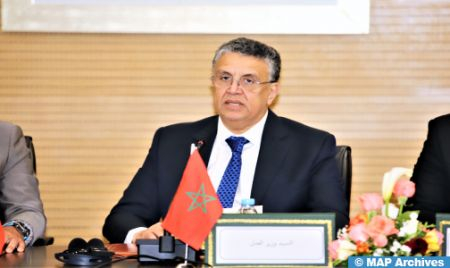Morocco’s Efforts to Fight Discrimination Highlighted in Geneva
Justice Minister Abdellatif Ouahbi reiterated, Wednesday in Geneva, Morocco’s concern to combat various forms of racial discrimination and to enshrine the values of equality and cultural pluralism in the legal text and social reality. Addressing the 111th session of the Committee on the Elimination of Racial Discrimination on the occasion of the combined examination of the 19th to 21st periodic reports on the implementation of the International Convention on the Elimination of All Forms of Racial Discrimination, Ouahbi noted that the Moroccan Constitution of 2011 has enshrined the harmonious blend of national identity tributaries and universal values. It also recognizes cultural and linguistic diversity as a social reality. The Constitution, he added, established the frame of reference relating to the prohibition and combating of all forms of discrimination, acknowledging equality between Moroccan citizens and foreign residents, and the expansion of economic, social, cultural, and environmental rights. Highlighting the Kingdom’s position as a forum for African, Eastern, and Mediterranean intercultural exchange and a homeland for the values of openness, moderation, tolerance, dialogue, and mutual understanding, the Minister noted that this privilege has been established thanks to the depth of the historical and central position of the institution of “Imarat al Mouminine” (Command of the Faithful), in its symbolic, spiritual, and functional dimensions, as a safeguard and fundamental pillar for the protection of the rights and freedoms granted under the Constitution and international obligations. The Minister also underlined the special status of the Hebrew component and the freedom with which Christians practice their religion, describing it as a model of coexistence and intercultural exchange between the various components of Moroccan society and a tangible proof of the state’s general orientation towards guaranteeing freedom of worship based on the values of tolerance, coexistence, and dialogue. On the cultural side, Ouahbi noted that the Kingdom has adopted a new and integrated cultural policy aiming to value the material and immaterial national cultural capital, rehabilitate public cultural facilities, ensure proximity and improved access, create structured cultural projects, and encourage pluralistic cultural production. In this regard, he underlined the adoption and implementation of the regulatory law on the official character of the Amazigh language and its integration into education and various priority sectors of public life. The Kingdom has also paid close attention to the preservation and enhancement of Hassani culture and heritage through the launch of qualitative projects as part of the implementation of the development model specific to the southern provinces, said the Minister. He mentioned in that regard the organization of cultural festivals, support for cultural projects and associations, and the activities of the Center for Hassani Studies and Research. In the same vein, the Ouahbi reviewed efforts to preserve, enhance, and protect the Hebraic tributary of Moroccan cultural heritage through the implementation of restoration and rehabilitation projects in several Moroccan Jewish neighborhoods and spaces, the integration of Moroccan Jewish culture and history into teaching programs from the earliest levels of education, the creation of centers of memory and museums of Jewish culture, and the implementation of programs to enhance the value of Jewish intangible cultural heritage in the handicrafts industry. The members of the Moroccan delegation interacted with various questions and comments from the members of the UN committee in the presence of Morocco’s Ambassador and Permanent Representative in Geneva, Omar Zniber, and the Secretary General of the Interministerial Delegation for Human Rights (DIDH), Abdelkarim Boujradi. They also highlighted the Kingdom’s multi-sectoral efforts and policies to combat various forms of racial discrimination, particularly in vital sectors such as the judiciary, national security, education, immigration, and the media.

